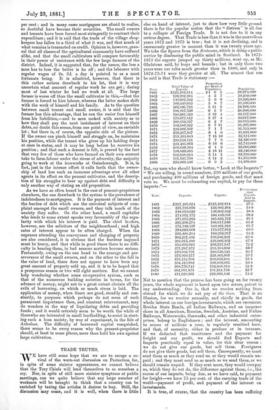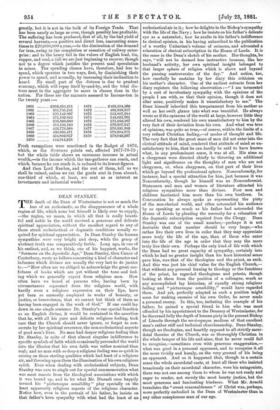TRADE TRUTHS.
WE have still some hope that we are to escape a re- vival of the worn-out discussion on Protection, for, in spite of some sinister appearances, we cannot believe that the Tory Chiefs will lend themselves to so senseless a cry. Nor, in spite of still more sinister symptoms at public meetings, can we quite believe that any large number of workmen will be brought to think that a country can be enriched by taxing the articles it desires to buy. Still, the discussion may come, and it is well, when there is little else on hand of interest, just to show how very little ground there is for the popular notion that the " distress " is all due to a collapse of Foreign Trade. It is not due to it in any serious degree. That Trade is less than it was in the marvellous years 1872 and 1873 is true ; but it is not declining, and is enormously greater in amount than it was twenty years ago. We take the figures from the Scotsman, which is doing a public service by disabusing the public mind in Scotland. In 1872- 1873 the exports jumped up thirty millions, went up, as Mr. Gladstone said, by leaps and bounds ; but in only those two years were our sales much greater than in 1880, and only in 1872-73-74 were they greater at all. The utmost that can be said is that Trade is stationary :—
Proportion
Year. Total Value of Exports. per Head of Population. Population.
1861 £125,102,814 £4 6 5 28,974,000 1862 123,992,264 4 5 7 29,200,000 1863 146,602,342 5 0 0 29,395,000 1864 160,449,053 5 8 7 29,566,000 1865 165,835,725 5 11 5 29,768,000 1866 188,917,536 6 5 7
29,94,6,000
1867 180,961,923 5 19 4 30,157,000 1868 179,677,812 5 17 4 30,617,000 1869 189,953,957 6 2 7 30,913,000 1870 199,586,322 6 7 11 31,205,000 1871 223,066,162 7 1 7 31,513,000 1872 256,257,347 8 1 0 31,835,000 1873 255,164,603 7 18 10 32,124,000 1874 239,558,121 7 7 9 32,426,000 1875 223,465,963 6 16 6 32,749,000 1876 200,639,204 6 1 3 33,093,000 1877 198,893,065 5 18 11 33,446,000 1878 192,848,914 5 14 1 33,799,000 1879 191,531,758 5 12 2 34,155,000 1880 223,060,446 6 9 5 34,468,000 But, say men who should know better, "Look at the Imports !" "We are selling, in round numbers, 230 millions of our goods, and purchasing 400 millions of foreign goods, and that must ruin us. We must be exhausting our capital, to pay for these imports :"—
Year. Imports. Per-eentage that Exports. Exports bear to Imports.
1861 £217,485,021 ...... £125,102,814
57.5
1862 225,716,976 123,992,264 51.9 1863 248,919,020 146,602,342
58-8
1864 274,952,172 160,449,053 58-3 1865 271,072,285 165,835,725
61-1
1866 295,290,274 188,917,536
63.9
1867 275,183,137 180,961,923 651 1868 294,693,608 179,677,812
60.0
1869 295,460,214 189,953,957 64-2 1870 303,257,493 199,586,322
65.8
1871 331,015,480 223,066,162
67.3
1872 354,693,624 256,257,347 72-2 1873 371,287,372 255,164,603
68.7
1874 370,082,701 239,558,121 64-7 1875 373,939,577 223,465,963
59-7
1876 375,154,703 200,639,201 53-4 1877 394,419,682 198,893,065
50-4
1878 368,770,742 192,848.914
52.3
1879 362,991,875 191,531,758
52.7
1E80 411,229,565 223,060,446 54.2
Not to mention that the process ha3 been going on for twenty years, the whole argument is based upon two errors, patent to any understanding. One is, that we receive nothing from abroad for which we do not pay at the time. That is an illusion, for we receive annually, and chiefly in goods, the whole interest on our foreign investments, which are enormous. Besides State Bonds, all Indian Railways, and an immense share in all American, Russian, Swedish, Austrian, and Italian Railways, Waterworks, Gasworks, and other industrial enter- prises, belong to Englishmen ; and the interest, amounting to scores of millions a year, is regularly remitted here, and that, of necessity, either in produce or in treasure. If we deducted that remittance and the payment for freight and our profit, we should find Exports and Imports practically equal in value, for this clear reason : we do not give our goods, but sell them. Foreigners do not give their goods, but sell them. Consequently, we must send them as much as they send us, or they would remain un- paid; and they must send us as much as we send them, or we should remain unpaid. If they sent more, they would overpay us, which they do not do, the difference against them, i.e., the excess of our imports, being due, as we have said, to payment for freight—we have 75 per cent, of the carrying trade of the world—payment of profit, and payment of the interest on investments.
It is true, of course, that the country has been suffering greatly, but it is not in the bulk of its Foreign Trade. That has been nearly as large as ever, though possibly less profitable. The suffering has been produced, first of all, by the bad yield of several harvests,—a positive and direct loss, amounting some- times to 120,000,000 a year,—to the diminution of the demand for iron, owing to the completion or cessation of railway enter- prise ; and to the heavy fall in the values of English lead, tin, copper, and coal, a fall we are just beginning to recover, though not to a degree which justifies the present mad speculation in mines. The spending classes have, therefore, had less to spend, which operates in two ways, first, by diminishing their power to spend, and secondly, by increasing their inclination to hoard. No small part of the distress is due to prudent economy, which will repay itself by-and-by, and the total dis- tress must in the aggregate be more in classes than in the nation. For these are the amounts assessed to Income-tax in the twenty years :-
1861 ... ...... £335,654,211 1871 £465,594,366 18e2 301,745,241 1872 482,338,317 1863 359,142,897 1873 513,807,284 1864 371,102,842 1874 543,025,761 1865 395,828,680 1875 571,056,167 1866 413,105,180 1876 . . 579,297,347 1867 423,773,568 1877 570,331,389 1868 430,368,471 1878 ...... 578,294,971 1869 434,803,957 1879 ...... 578,016,297 1870 444,914,228
Fresh exemptions were sanctioned in the Budget of 1876, which, as the Scotsman points out, affected 1877-78-79; but the whole table shows an enormous increase in actual wealth,—in the income which the tax-gatherer can reach, and which, because he can reach it, is reduced to its lowest figures.
And then Lord Sandon, and the rest of them, tell us we shall be ruined, unless we tax the goods sent in from abroad, one-third of which, at least, are sent us as interest on investments and industrial works



































 Previous page
Previous page